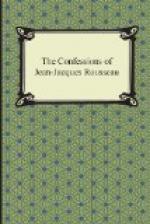I carried back in triumph the dear music book, which had been so useful to me, the air of Alpheus and Arethusa being almost all I had learned at the seminary. My predilection for this art started the idea of making a musician of, me. A convenient opportunity offered; once a week, at least, she had a concert at her house, and the music-master from the cathedral, who directed this little band, came frequently to see her. This was a Parisian, named M. le Maitre, a good composer, very lively, gay, young, well made, of little understanding, but, upon the whole, a good sort of man. Madam de Warrens made us acquainted; I attached myself to him, and he seemed not displeased with me. A pension was talked of, and agreed on; in short, I went home with him, and passed the winter the more agreeably at his chambers, as they were not above twenty paces distant from Madam de Warrens’, where we frequently supped together. It may easily be supposed that this situation, ever gay, and singing with the musicians and children of the choir, was more pleasing to me than the seminary and fathers of St. Lazarus. This life, though free, was regular; here I learned to prize independence, but never to abuse it. For six whole months I never once went out except to see Madam de Warrens, or to church, nor had I any inclination to it. This interval is one of those in which I enjoyed the greatest satisfaction, and which I have ever recollected with pleasure. Among the various situations I have been placed in, some were marked with such an idea of virtuous satisfaction, that the bare remembrance affects me as if they were yet present. I vividly recollect the time, the place, the persons, and even the temperature of the air, while the lively idea of a certain local impression peculiar to those times, transports me back again to the very spot; for example, all that was repeated at our meetings, all that was sung in the choir, everything that passed there; the beautiful and noble habits of the canons, the chasubles of the priests, the mitres of the singers, the persons of the musicians; an old lame carpenter who played the counter-bass, a little fair abbe who performed on the violin, the ragged cassock which M. le Maitre, after taking off his sword, used to put over his secular habit, and the fine surplice with which he covered the rags of the former, when he went to the choir; the pride with which I held my little flute to my lips, and seated myself in the orchestra, to assist in a recitative which M. le Maitre had composed on purpose for me; the good dinner that afterwards awaited us, and the good appetites we carried to it. This concourse of objects, strongly retraced in my memory, has charmed me a hundred time as much, or perhaps more, than ever the reality had done. I have always preserved an affection for a certain air of the ‘Conditor alme Syderum’, because one Sunday in Advent I heard that hymn sung on the steps of the cathedral, (according to the custom of that




